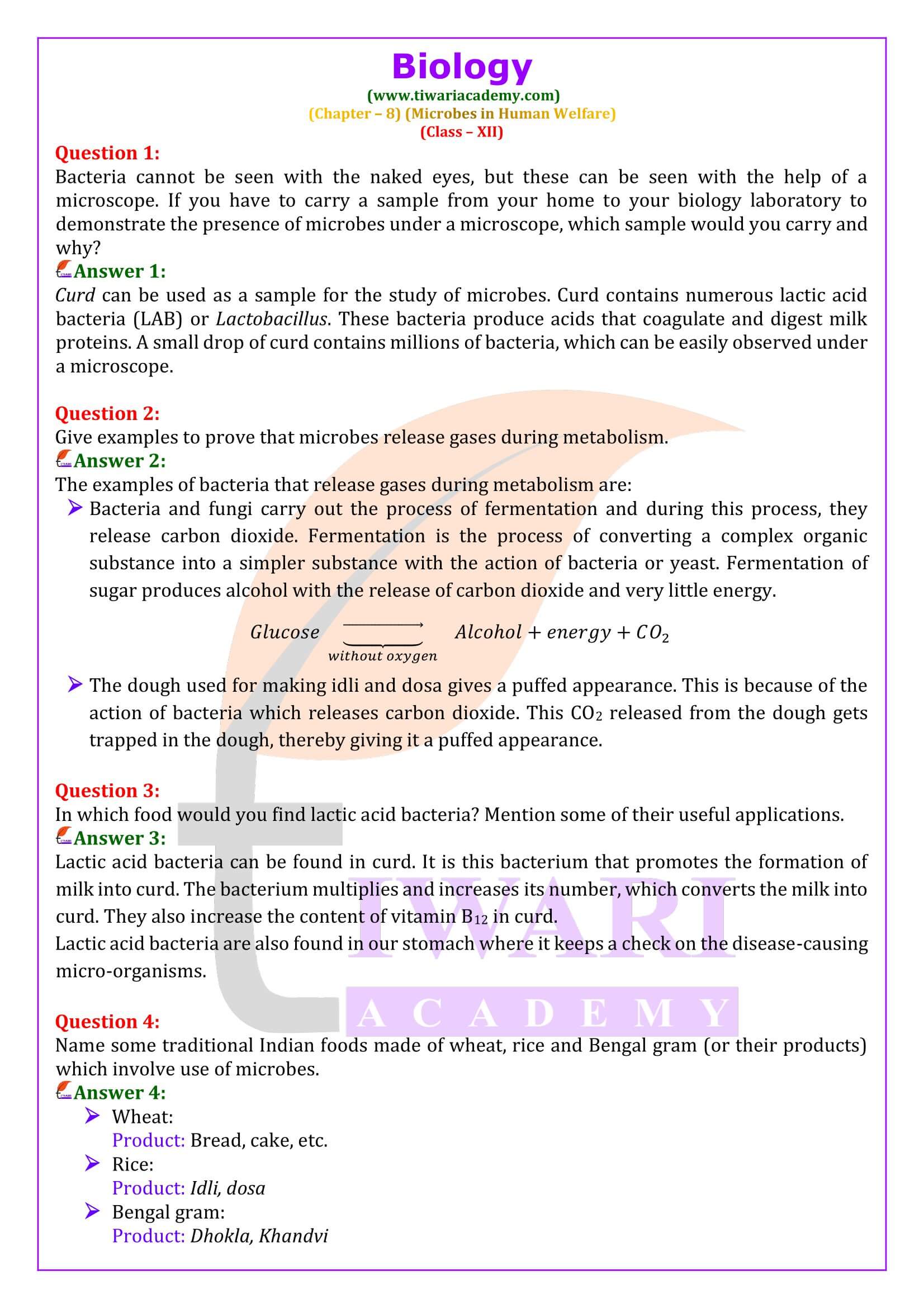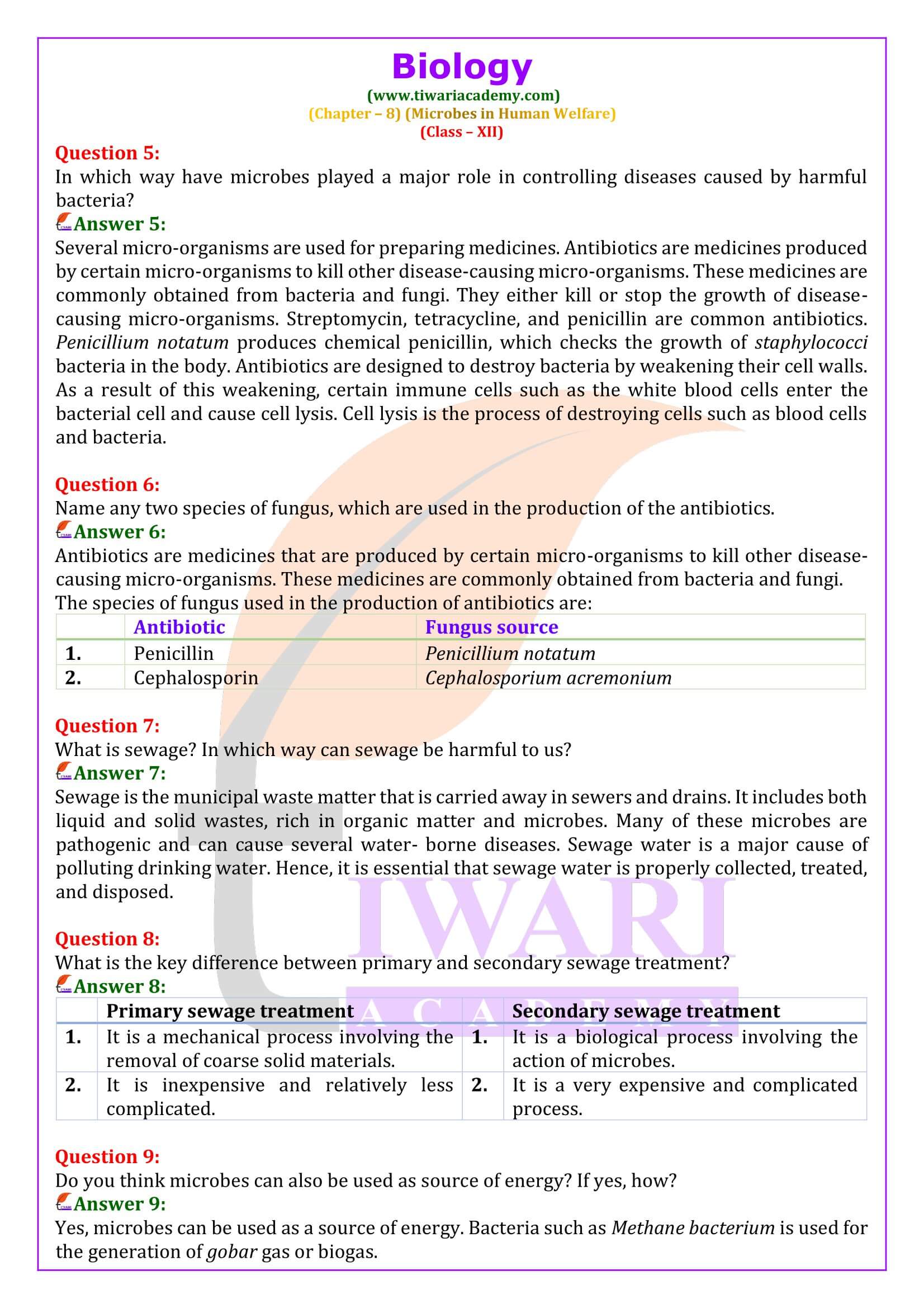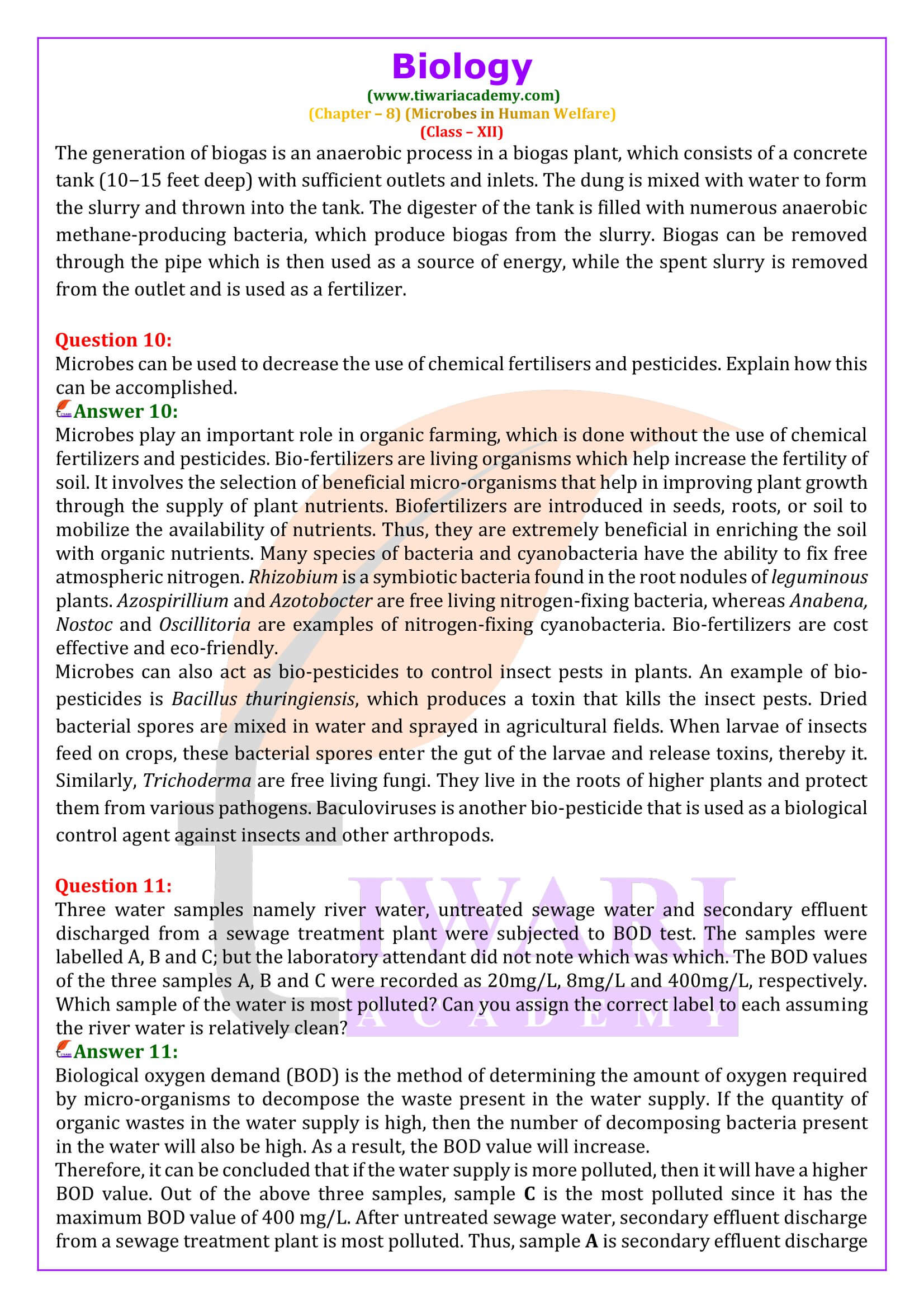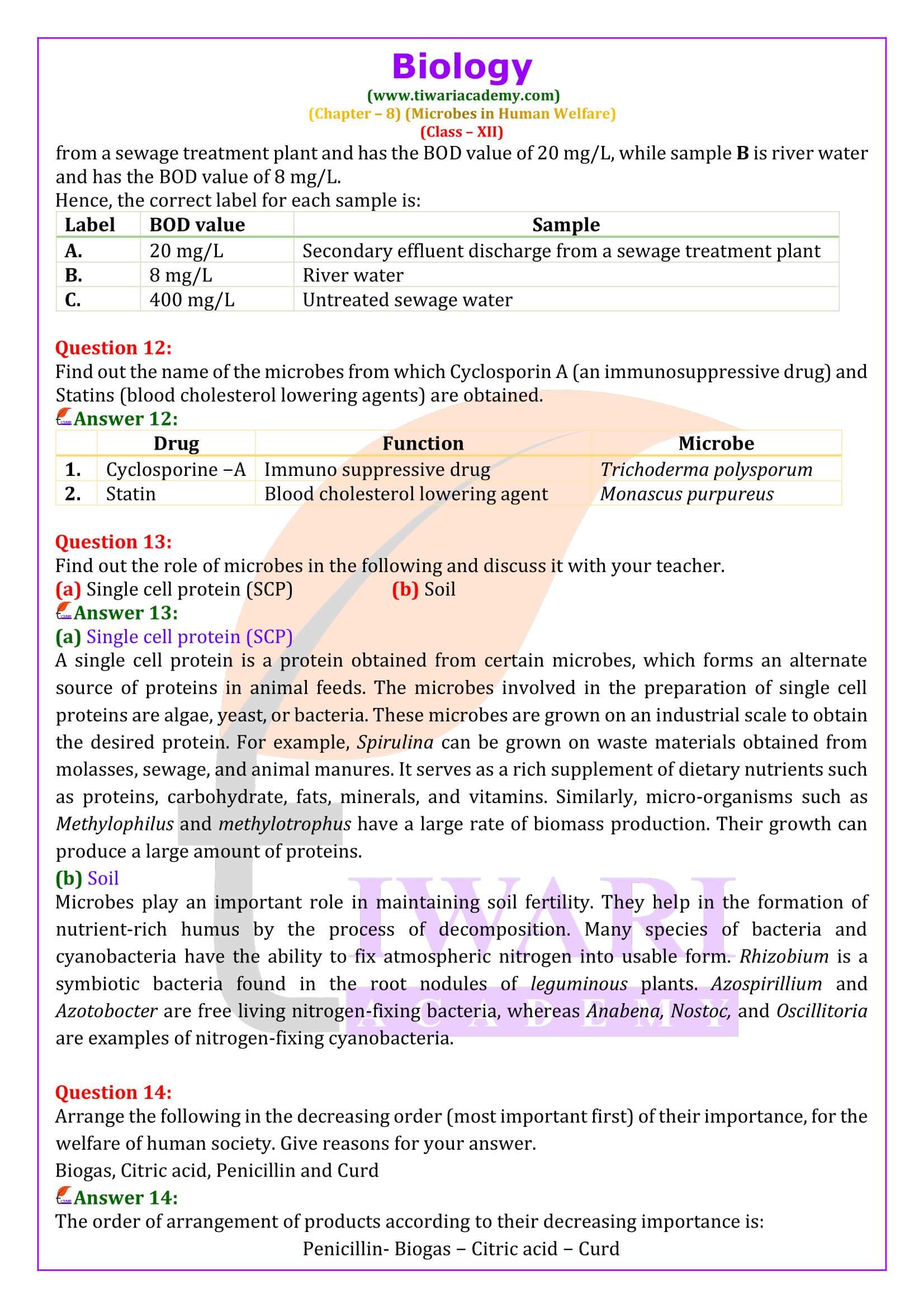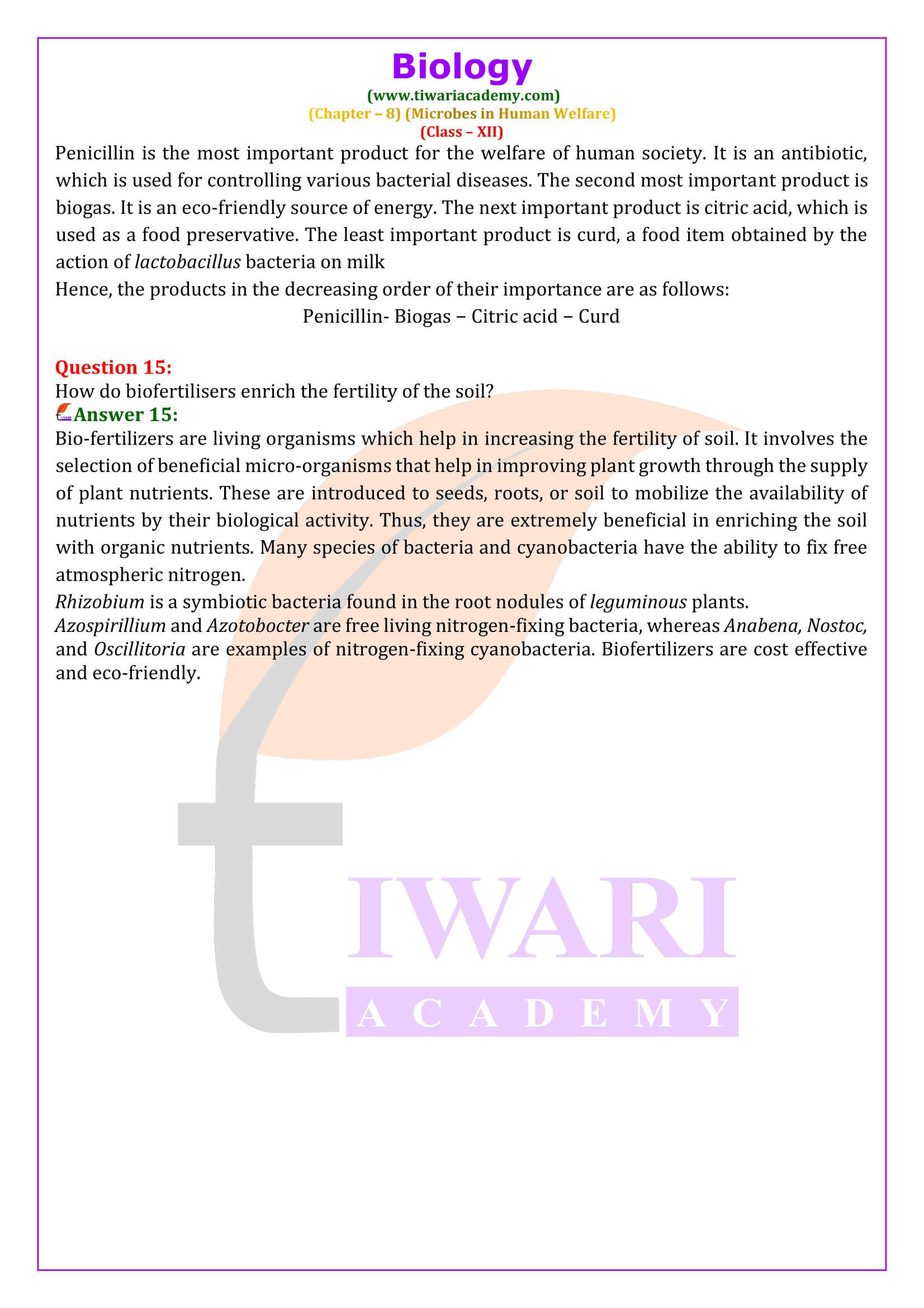NCERT Solutions for Class 12 Biology Chapter 8 Microbes in Human Welfare in Hindi and English Medium PDF file format to Study Online without downloading updated for new academic session 2024-25. NCERT Solutions for class 12 and notes are also available based on latest Curriculum 2024-25 issued by CBSE. Ask here Whatever in Your mind and Discuss it with your friends and classmates via discussion forum.
NCERT Solutions for Class 12 Biology Chapter 8
Class 12 Biology Chapter 8 Microbes in Human Welfare Solutions
| Class: 12 | Science |
| Subject: | Biology |
| Chapter 8: | Microbes in Human Welfare |
| Mode of Content: | Images, PDF and Videos |
| Academic Session: | 2024-25 |
| Medium of Content: | Hindi and English |
Class 12 Biology Chapter 8 Solutions in English
NCERT Solutions for Class 12 Biology Chapter 8 Microbes in Human Welfare are given here to download in PDF format free for new academic session 2024-25. Download NCERT Books and Offline Apps based on latest CBSE Syllabus 2024-25.
Important Terms related to Chapter 8
1. Baculovirus: Pathogens that attack insects and other arthropods. They are used to kill harmful pests and arthropods e.g., Nucleopolyhedro virus.
2. Flocs: During secondary treatment of effluent, excessive growth of aerobic bacteria and fungi form a mass of mesh like structure called flocs.
3. Bio-fertilisers: Microorganisms which produce fertilisers and enrich the soil e.g., bacteria, cyanobacteria and fungi.
4. Bioactive Molecules: Molecules produced for commercial use from microbes and used for various purposes e. g., Trichoderma polysporum (fungus) is used to obtain immunosuppressive agent cyclosporine-A.
5. Biochemical Oxygen Demand (BOD): Total amount of oxygen consumed by bacteria for oxidation of organic matter present in one litre of water.
More Terms to know
1. Immunosuppressive Agent: Chemicals which suppress the immunity against organ transplant.
2. Organic Farming: Technique of farming, in which bio-fertilisers are used to enrich the soil, without using chemical fertilizers and pesticides to reduce their harmful effect on human health.
3. Biological Control: Reduction of pest population by natural enemies minimising the use of harmful chemical pesticide. E.g. lady bird beetle can eradicate aphids.
4. Thermal vents: The sites deep inside the geysers/hot springs and oceans where the average temp is as high as 100°C.
5. Methanogens: Bacteria producing large quantity of methane during decomposition of organic matter.
ABBREVIATIONS
GAP: Ganga Action Plan
KVIC: Khadi and Village Industries Commission
TMV: Tobacco Mosaic Virus
YAP: Yamuna Action Plan
IPM: Integrated Pest Management.
Microbes as bio-fertilizers
1. Rhizobium: Have symbiotic association with roots of leguminous plants, help in atmospheric nitrogen fixation.
2. Azospirillum and Azotobacter: Free living in soil and help in nitrogen 2-fixation enrich nitrogen 2-content of soil.
3. Mycorriza: Symbiotic association of fungi with roots of higher plants. Fungi help in absorption of phosphorous from soil. It belong to genus Glomus Provide resistance to root borne pathogens, tolerance to salinity and drought.
4. Cyanobacteria: Found in aquatic or terrestrial environment, help in nitrogen fixation, add organic matter to the soil, increase fertility of soil, e.g., Nostoc, Anabaene, Oscillatoria. In paddy fields, these acts as bio-fertilisers.
Name some traditional Indian foods made of wheat, rice and Bengal gram (or their products) which involve use of microbes.
Wheat: Product: Bread, cake, etc. Rice: Product: Idli, dosa Bengal gram: Product: Dhokla, Khandvi.
Important Questions on 12th Biology Chapter 8
Give examples to prove that microbes release gases during metabolism.
The examples of bacteria that release gases during metabolism are: Bacteria and fungi carry out the process of fermentation and during this process, they release carbon dioxide. Fermentation is the process of converting a complex organic substance into a simpler substance with the action of bacteria or yeast. Fermentation of sugar produces alcohol with the release of carbon dioxide and very little energy. The dough used for making idli and dosa gives a puffed appearance. This is because of the action of bacteria which releases carbon dioxide. This CO2 released from the dough gets trapped in the dough, thereby giving it a puffed appearance.
Bacteria cannot be seen with the naked eyes, but these can be seen with the help of a microscope. If you have to carry a sample from your home to your biology laboratory to demonstrate the presence of microbes under a microscope, which sample would you carry and why?
Curd can be used as a sample for the study of microbes. Curd contains numerous lactic acid bacteria (LAB) or Lactobacillus. These bacteria produce acids that coagulate and digest milk proteins. A small drop of curd contains millions of bacteria, which can be easily observed under a microscope.
In which food would you find lactic acid bacteria? Mention some of their useful applications.
Lactic acid bacteria can be found in curd. It is this bacterium that promotes the formation of milk into curd. The bacterium multiplies and increases its number, which converts the milk into curd. They also increase the content of vitamin B12 in curd. Lactic acid bacteria are also found in our stomach where it keeps a check on the disease-causing micro-organisms.
In which way have microbes played a major role in controlling diseases caused by harmful bacteria?
Several micro-organisms are used for preparing medicines. Antibiotics are medicines produced by certain micro-organisms to kill other disease-causing micro-organisms. These medicines are commonly obtained from bacteria and fungi. They either kill or stop the growth of disease-causing micro-organisms. Streptomycin, tetracycline, and penicillin are common antibiotics. Penicillium notatum produces chemical penicillin, which checks the growth of staphylococci bacteria in the body. Antibiotics are designed to destroy bacteria by weakening their cell walls. As a result of this weakening, certain immune cells such as the white blood cells enter the bacterial cell and cause cell lysis. Cell lysis is the process of destroying cells such as blood cells and bacteria.
What is sewage? In which way can sewage be harmful to us?
Sewage is the municipal waste matter that is carried away in sewers and drains. It includes both liquid and solid wastes, rich in organic matter and microbes. Many of these microbes are pathogenic and can cause several water- borne diseases. Sewage water is a major cause of polluting drinking water. Hence, it is essential that sewage water is properly collected, treated, and disposed.
Do you think microbes can also be used as source of energy? If yes, how?
Yes, microbes can be used as a source of energy. Bacteria such as Methane bacterium is used for the generation of gobar gas or biogas. The generation of biogas is an anaerobic process in a biogas plant, which consists of a concrete tank (10−15 feet deep) with sufficient outlets and inlets. The dung is mixed with water to form the slurry and thrown into the tank. The digester of the tank is filled with numerous anaerobic methane-producing bacteria, which produce biogas from the slurry. Biogas can be removed through the pipe which is then used as a source of energy, while the spent slurry is removed from the outlet and is used as a fertilizer.
How do biofertilisers enrich the fertility of the soil?
Bio-fertilizers are living organisms which help in increasing the fertility of soil. It involves the selection of beneficial micro-organisms that help in improving plant growth through the supply of plant nutrients. These are introduced to seeds, roots, or soil to mobilize the availability of nutrients by their biological activity. Thus, they are extremely beneficial in enriching the soil with organic nutrients. Many species of bacteria and cyanobacteria have the ability to fix free atmospheric nitrogen. Rhizobium is a symbiotic bacteria found in the root nodules of leguminous plants. Azospirillium and Azotobocter are free living nitrogen-fixing bacteria, whereas Anabena, Nostoc, and Oscillitoria are examples of nitrogen-fixing cyanobacteria. Biofertilizers are cost effective and eco-friendly.
